The Ghoul King Read online
Page 6
I nodded gravely. Quinn looked at me. I turned quickly away. I still could not stand those blue eyes. “I saw it all,” I mumbled. “As a boy. I wanted to help, got wind that there was more to healing than they taught in the medical school, and I got censured for asking too many questions.”
“You’re lucky they didn’t kill you,” said Quinn.
“And yet here I am. Why should we suffer and die when the knowledge to preserve life is here, under our feet?”
“Church says so,” said Quinn. “Angels say so.”
“The church lies!” I said, surprising myself. I became suddenly still, forgetting for a second that I spoke to a creature of the angels.
Quinn sucked his bottom lip and stared at the ground. “Alright, alright. We’ll do it. We’ll strike out at first light. We need to be entering the city right after the sun comes up. The ghouls’ll retreat back underground as soon as predawn comes, but the dark belongs to them. It’ll be suicide to go in there while they’re awake.”
Quinn stood and looked out the door across the cracked plain of glass. “It’s going to be a long night.”
* * *
It took me an age to fall asleep. The ruin was steeped in the memory of blood and anger, and it pressed in on me. When I managed to shake that feeling, the thought of the poison in the ground seeping through my pores and defacing my book of life with merry instructions for tumors kept me awake. Finally, exhaustion got the better of me. It felt like five minutes later Thomas was shaking me awake.
“Hey, hey! Jaxon, get up!”
“Whu?” I managed. He yanked back my blanket. Freezing air assaulted me. I stood shakily and he shoved a rifle at me. The fire was a low heap of embers at the doorway. Rachel was on duty there, staring out into the dark.
“Cold as hell up on the wall,” said Thomas softly, draping my blanket around my shoulders.
I thanked him, and picked my way through the camp. The horses blew and snorted in their corner. Robyn and Fillip were asleep close by.
The sky had covered itself over with clouds that glowed with dim moonlight. Quinn was silhouetted against them, looking out toward the fallen city of Columbus.
I clambered up the cracked wall to join him. I wished then I’d come up in the day so I’d have known where to step. The wall was three feet wide, but uneven, the concrete crumbling. Broken rebar poked out. I’ve seen concrete reinforced with iron over in Virginia, knowledge the Emperor took back before he lost the favor of Pittsburgh and was cast down. This wasn’t iron, but a dull, rustless metal. It was sharp where it had been wrenched apart. I was walking along a trap of razors. Quinn glanced at me.
“Shhh,” he said. I hadn’t realized I was making any noise.
He beckoned to me, and set off along the wall toward the eastern corner closest to the city. I followed warily, rifle cradled under one arm, the other flapping to stop my blanket snagging on the spikes. He crouched and motioned for me to do the same. I was so close to him I felt his heat, smelled the leather and sweat of him.
“Movement,” he breathed into my ear. He pointed. I could see nothing at all. The land dipped toward the Scioto between us and the ruins of the Dreaming City, and became a pit of shadow. Soundless lightning flickered around the pinnacles of the broken towers, but it did nothing to illuminate that stretch of dark, and the Moon was masked by the clouds.
“I can’t see anything,” I said.
“Shhh!” warned Quinn. He pointed up. A break was coming in the cloud. Enough moonlight spilled from the sky to reveal what he’d been trying to show me. Pools of water in the marsh lit up. Between them, things were running.
Quinn patted my arm and handed me a pair of binoculars. I trained them on the movement. Out there, less than a mile from our position, were a pack of twenty or more ghouls.
The ghouls were naked, streaked in filth and blood. They ran, heading north, stooped, hands close to the ground like they would be happier galloping on all fours, their broad feet splashing in the marsh. All was soundless that far away, lending the scene a spectral feeling that chilled me. Their bodies were altered from man’s basic pattern, the bones in their legs lengthened, the pattern of their muscles rewritten. One sprang lightly up onto a boulder of concrete, and crouched there, watching its fellows pass. This one I focused Quinn’s binoculars on. I thought it a male at first, but then I saw the flat dugs on its chest. There was no hint of femininity to it other than those flaccid breasts. The neck was very long, the spine knobbed. Its jaw was pronounced, with fangs jutting upward over the upper lip when the mouth was closed. The hands were heavy, spade-like, with curved talons in place of nails. The feet were flexible, somewhat like a bird’s, and they gripped the rock. All the while I watched it was in motion, swaying sinuously, as if keeping still pained it. The eyes swept over its galloping tribe, and up to the moon. When they caught its light, they glowed yellow like a wolf’s. The last of them ran by, and it jumped down, gave voice to a cry that reached me up on that wall, a woeful shriek as much sorrowful as it was fearsome. They vanished into the willow scrub of the swamp. I lowered the binoculars. Quinn took them back.
“Will they attack?” I asked.
“No, though they know we are here. They will avoid the fire. They can smell how many we are. They know we are watching. If we were less vigilant, it’d be another story.”
“Why would anyone make such things?” I said with a shudder.
“You don’t believe God did?” stated Quinn. “I’ve heard the way you talk about the angels. You an atheist?” A question more commonly posed as an accusation leading to church court and a fiery death.
I shook my head. “I believe. I have read the Bible, I trust in the words of Jesus. The God I believe in is merciful. All the evil I have seen in my life has been perpetrated by those acting in God’s name, not by God.”
“The disease that makes the dead made the ghouls too, do you understand?”
“Yes,” I said. “I have a broad grasp of the old sciences. Genetics and such.”
Quinn’s teeth flashed in the dark.
“Jenetics, the G is soft.”
Of course he knew that. My lack of knowledge shamed me. “The techniques are beyond me, but the principles I am familiar with. Rachel has a large amount of forbidden literature.”
“So then.” Quinn came closer. “The disease that makes the dead changes the ghouls differently. Ghouls are alive, properly alive, they’re not like the dead.”
“The dead are not dead either, it is a misconception, promoted by the church,” I said, hoping to reclaim some credibility.
Quinn shrugged. “They may as well be. When the mind dies the man dies. The ghouls preserve some of their intellect after their change. That is where they truly differ. They think, they communicate, they hunt in packs, and they breed. When one is made, they are compelled to seek out others of their kind. It’s a terrible fate, a half-life. Sometimes, when you look into their eyes, you can see the person they once were, trapped in a monster’s body. Be careful in the city, Jaxon. I do not trust that device of your leader, Rachel.”
“You are trying to turn us against each other!” I said.
“Keep your voice down! No, I’m not. I’m naturally cautious is all. I’ve had a lot of dealings with the angels. What’s in the box, Jaxon? That device she had with the map, that sort of thing doesn’t work without a network or input from another machine.”
“Ask her yourself,” I said. In truth, I barely understood what he was saying. I did not know what it was Rachel had then. If I had, I would have told him. It might have saved us all, even Rachel.
Quinn shrugged and wrapped his arms about his knees against the cold. “Maybe I will. You might succeed. The medical core of the city may still be intact, and Rachel may have the means to read it, record its information, and understand it. You may even avoid the angels for a while once she has. Ultimately it’s a mighty big risk for not much gain, because you will only be free for a few weeks, a month at best.”
“
The more people know, the harder it is for them to suppress the old knowledge,” I said.
“Now you sound like a fanatic. You’re playing with fire. You share what you learn and the angels will bring a visitation of the dead down on your newly enlightened folk, and the knowledge will die again. That’s how they stop it from spreading. That’s how they make people fear.”
“Then someone else will do the same,” I said, with hollow courage, “and again, until the tyranny of the angels is overthrown. Or we might come to a compromise. The angels of Columbus were kinder than our new masters. They let us use more of the knowledge from the Gone Before.”
“Yeah,” said Quinn. “And the other angels declared them fallen. Even the Emperor of Virginia, who was so intent on resurrecting the old sciences that the angels tore him limb from limb, he fought against Columbus. This world is cruel, Jaxon. Every man and Dreaming City out for itself. There isn’t no one so small as you going to change it. Live well, love well, raise a family. That’s a better use of your life than this.”
“You don’t do those things. Do you think you can change the world? Am I not gifted enough?” I said bitterly.
“I’ve a lot of gifts I didn’t ask for,” he said. “But I can’t change anything either. I’m past living a normal man’s life and the thought of that eats me up every day. I’ve one wrong to set right, that’s all. I can’t do much more than that, if I can do that at all.”
“You are an agent of the angels. Why should I trust you?”
“You shouldn’t,” said Quinn. “I didn’t ask to come with you.”
“You were coming anyway.”
“True.”
“Then tell me what you want in there.”
He filled his cheeks with air and blew it out in a weary sort of way. “I need to get into a Dreaming City,” he said.
“Then you shall be successful tomorrow.”
Quinn’s eyes shone with reflected moonlight. “It’s not that one I need to get into.”
Old Columbus
MORNING CAME, AND WE DEPARTED. Robyn was stiff with her farewells, still aggrieved at being left behind. We took only the bare essentials, water, food for the day, ropes and climbing gear, electric flashlights and pitch torches. And our weapons, of course. I set out into the pale predawn with a heavy heart, stepping through that ragged door over the remains of our fire as glumly as a man on the way to the scaffold. Facing the night dying in the west, looking out into the wilds, I was seized by the desire to run and not stop until the broken spires of Columbus were over the horizon, but my feet dumbly followed the others around the building and down the gentle slope of the valley to the broken course of the Scioto River.
Fallen structures and dead trees had clogged the flow. The Scioto is not a mighty flood, and is much diminished by the diversion of its tributaries. Not far north of Newtown its braidings weave themselves back into a single channel, but by Old Columbus the river splits into rivulets, many ending in stagnant pools, and all of it surrounded by thick brakes of stunted willow and alder. I was glad of the time of the year, for in summer the swamp would surely be swarming with mosquitoes.
We crossed the floodplain. Ice fringed brown waters. Frost dusted the grass. We passed the boulder I had seen the ghoul perch upon as the pack had run by. The ground there was deeply scored by their claws, and the concrete bore parallel scratches from the talons of the female’s feet. There was a faint, musky scent on the air. Quinn pointed out their droppings, black with blood and clotted with hair.
The rumble of distant water grew. The river spread itself out further into many wide, shallow channels, but in places there were deep lakes, oddly shaped, the works of the Gone Before. Their earthworks were everywhere, the signs of their endless roads. And as we drew nearer to the spires of the city, more artifacts of the distant past emerged from their coverings of grass and tree. The piers of a mighty bridge loomed from dry ground, the river having sidestepped them long ago.
Then we came to the field of wonders.
Angelic armor lay scattered around, half-submerged in the water, or resting broken backed on the remains of shattered buildings. All of it was stripped of paint and decoration by the forces that had downed it, but such is the art of the angels that many of the suits were recognizable for what they were. They were forged for giants, tall as three men, with long arms of banded steel mounting fearsome and incomprehensible weapons. Faceless helms sat atop armored necks, and from the backs of each spread wings. These were delicate, made of some sort of glass that had wilted in the heat of the bombs where it had not been blasted completely away. The wind moaned through the gaps in the plates. I approached one that was almost whole. The wings lay about it in shattered pieces, but they kept their rough shape, so that the armor looked like a representation of St. Michael cast into the windows of a church. Its arms were flung outward, like our lord Jesus Christ’s upon the cross. The left hand was missing, but in the right, it bore a sword as tall as I am all crusted over with corrosion. I peered inside the helmet, but found no bones or other remains. I have often thought that the angels might be liars, perhaps even machines, who profane the name of God. I have never believed them to be divine. But the suit was empty even of mechanisms, and I doubted my conviction.
The field of armor continued until we emerged from the swamp and continued out onto the higher ground on the other side. There were other machines of war there. Dart-like aircraft were broken all around, like a flock of birds fallen dead at once. And a giant, tracked vehicle, circular holes on top and sides where once weapons were mounted. We saw no signs of bones other than those of animals torn apart by ghouls, and these were in poor condition, smashed to pieces so the marrow could be extracted.
* * *
The lands around Columbus are not much varied in elevation, but we were forced to climb upward a way from the swamp. A ridge divided the Scioto from the old city and its tributaries, a wrinkle thrown up by the titanic forces of Columbus’s destruction.
We were in shadow as we walked, and the air was chill. I had the horrible sensation of being watched. My eyes were forever straying to the black thickets, leaving my feet to the mercy of the churned earth, glass, concrete, and metal that made up the slope.
At the top, warm fall sun bathed us. A great scar opened before us into the earth. The ground had slipped outward and downward, cratered as neatly as if it had been struck with a hammer, exposing up the subterranean spaces of Old Columbus to the sky. The seven spires leaned drunkenly on the far side, their toppled brothers and sisters making a labyrinth of shattered concrete around them. A waterfall fifty yards across tumbled over the lip of the broken plaza and into a lake which occupied much of the uppermost level of the under city. It filled the crater deeply, a dark blue, and extended under our feet into artificial caverns. There must have been a further drop and another waterfall, for the lake level was forty feet below us, and had not filled the hole to the brim. Scree of concrete and metal spars made up the lakeshore. Cliffs of compressed floors and slumped roads were pierced by ancient corridors turned into square-mouthed caves. It was a warren, one almost certainly full of ghouls.
“The angels dig deep,” said Quinn, peering over the edge. “This is not the work of the Gone Before. You have your map? Give it to me.”
Rachel handed over the device. Quinn seemed familiar with its use. He scrutinized it awhile, then pointed to a pier jutting over the lake, a fallen building, I think. The ragged shore below followed it, forming a promontory in the lake half-joined to the pier above by blocky, ruined scarps.
“The medical center is on the fifth level. If we’re lucky, we can get there. If we’re lucky. We could instead go this way, see if the datacore has really gone.” His fingers skated over the smooth glass of the device. “Here.” He held it up to Rachel. I got the impression he wasn’t proposing this as a serious course of action, but was instead presenting it to gauge Rachel’s reaction.
“We have to go to the medical center,” she said. Her hand stra
yed to the box.
“Maybe you should tell me what you have in there,” he said.
“Maybe you should mind your own business,” she replied.
“Fine,” he said.
“Why don’t we go down that slope?” Thomas said, pointing at a slab of concrete half the size of Newtown that made up the southern side of the lakeshore.
“If we rappel down off the promontory,” said Quinn, “we’ll be in direct sunlight the longest. We’ll have to find our way from there to the medical facility. There’s a major access tunnel not far from here. Off that there should be an elevator shaft or stairway we can use.”
“Angels need stairs?” I said.
Quinn ignored me.
“And if it’s collapsed?” said Thomas.
“Then we try another way,” said Quinn. “Thomas, Fillip,” he said. “Get the ropes.” He looked at the mouths of the caves in the lakeshore. I followed his gaze, half-convinced I saw movement in every one.
Thomas had some experience in climbing and rigged the ropes for our descent. Quinn went first, sliding smoothly to the beach. He drew both longsword and gun and moved away from the rope, then waved us down. One after another, Rachel, Fillip, Thomas, and then finally I followed.
I was numb to the fear of the drop. There was so much to be frightened of there, I freely own, but there was a tranquility to the place that took the edge off.
The waterfall rumbled on, a haze of spray hanging over the lip of the crater. In some ways, it was one of the most peaceful places I’ve ever seen in my life. Away from the boiling foam of the falls the lake was placid, that mirror sheen you find only on deep, still water. Not a ripple marred its surface, and it appeared a hole in the earth, through which another pale blue sky could be observed. I stop-started all the way down the rappel, unused to the technique, but it didn’t matter. I felt protected. That sounds strange, but there was, in that void, the sense of something greater. Of peace. Of God.

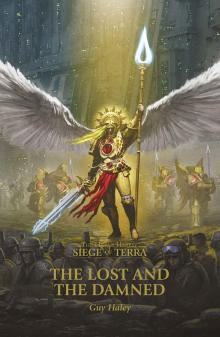 The Lost and the Damned (The Horus Heresy Siege of Terra Book 2)
The Lost and the Damned (The Horus Heresy Siege of Terra Book 2)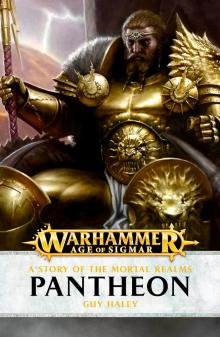 Pantheon
Pantheon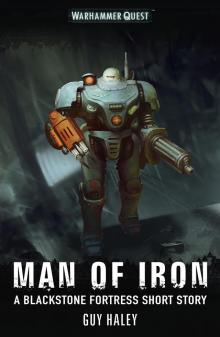 Man of Iron
Man of Iron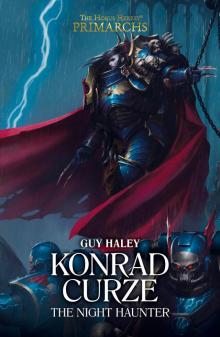 Konrad Curze the Night Haunter
Konrad Curze the Night Haunter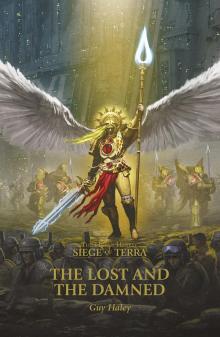 The Lost and the Damned
The Lost and the Damned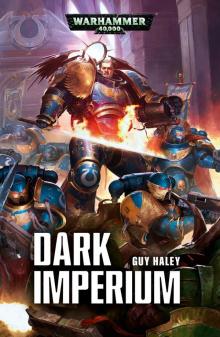 Dark Imperium
Dark Imperium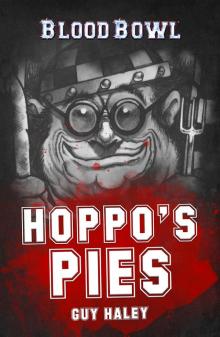 Hoppo's Pies
Hoppo's Pies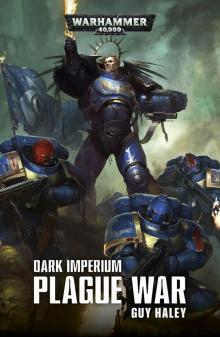 Dark Imperium: Plague War
Dark Imperium: Plague War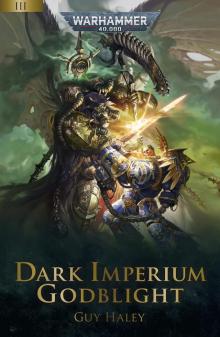 Dark Imperium: Godblight
Dark Imperium: Godblight Crash
Crash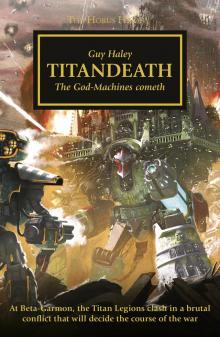 Titandeath
Titandeath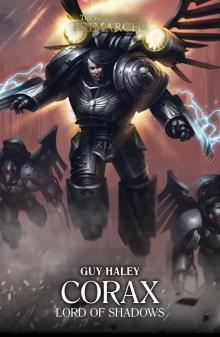 Corax- Lord of Shadows
Corax- Lord of Shadows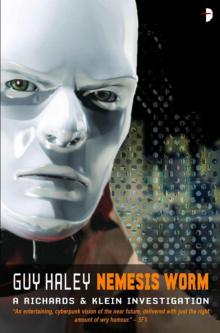 The Nemesis Worm
The Nemesis Worm Wolfsbane
Wolfsbane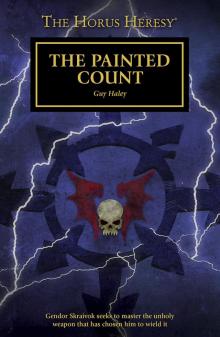 The Painted Count
The Painted Count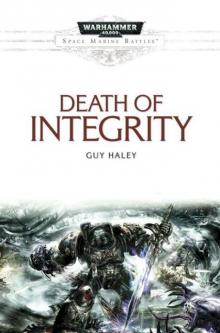 The Death of Integrity
The Death of Integrity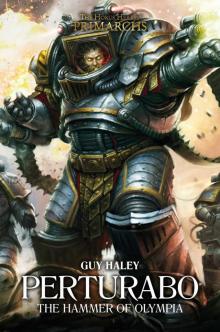 Perturabo: Hammer of Olympia
Perturabo: Hammer of Olympia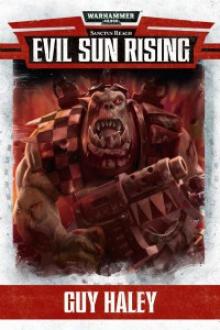 Evil Sun Rising
Evil Sun Rising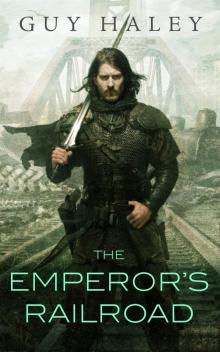 The Emperor's Railroad
The Emperor's Railroad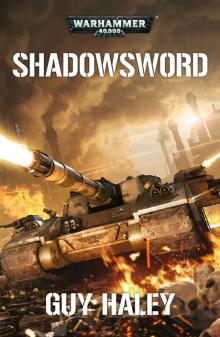 Shadowsword
Shadowsword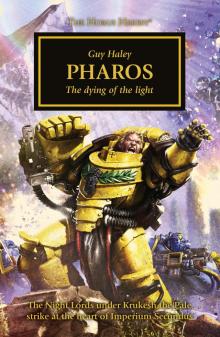 Pharos
Pharos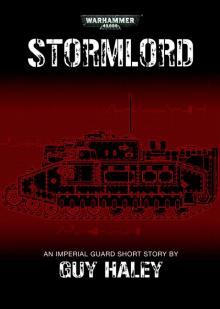 Stormlord
Stormlord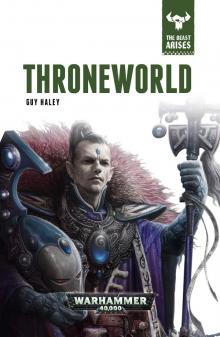 Throneworld
Throneworld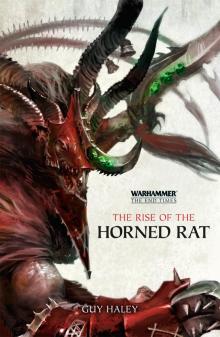 The End Times | The Rise of the Horned Rat
The End Times | The Rise of the Horned Rat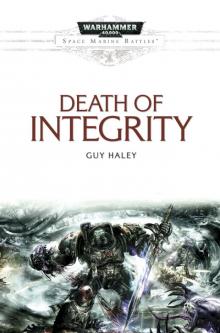 Death of Integrity
Death of Integrity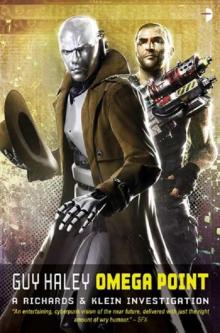 Omega Point
Omega Point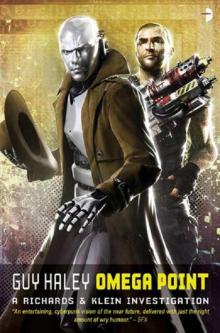 Omega point rak-2
Omega point rak-2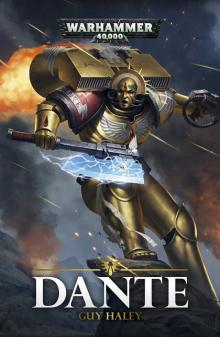 Dante
Dante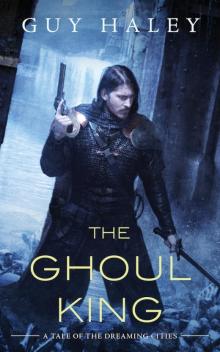 The Ghoul King
The Ghoul King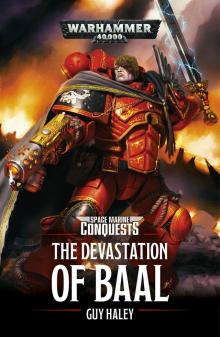 The Devastation of Baal
The Devastation of Baal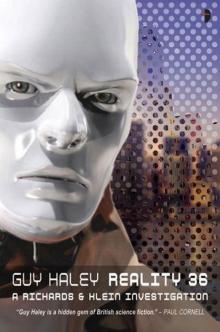 Reality 36: A Richards & Klein Novel
Reality 36: A Richards & Klein Novel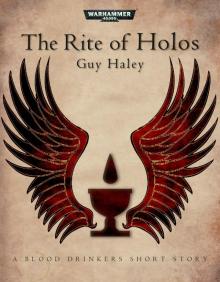 The Rite of Holos
The Rite of Holos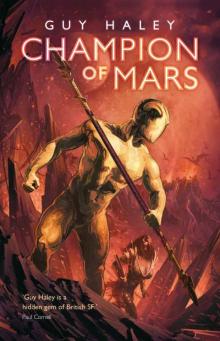 Champion of Mars
Champion of Mars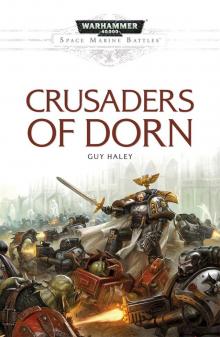 Crusaders of Dorn
Crusaders of Dorn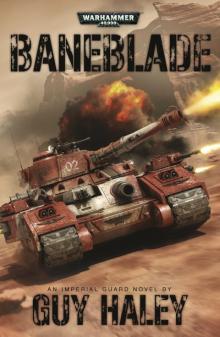 Baneblade
Baneblade